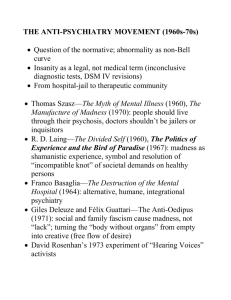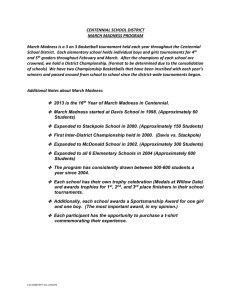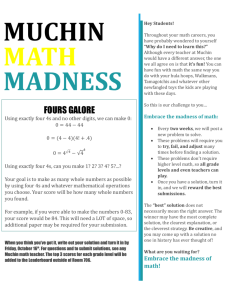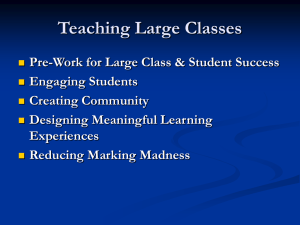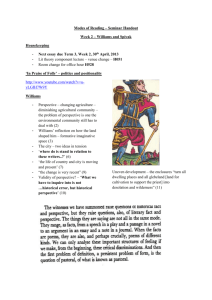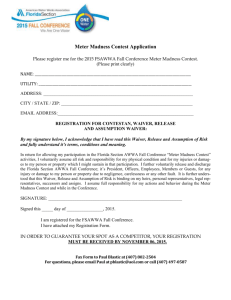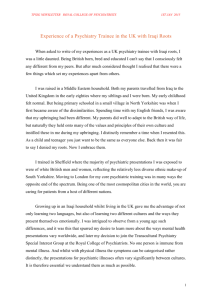Research model (on mental illness)
advertisement
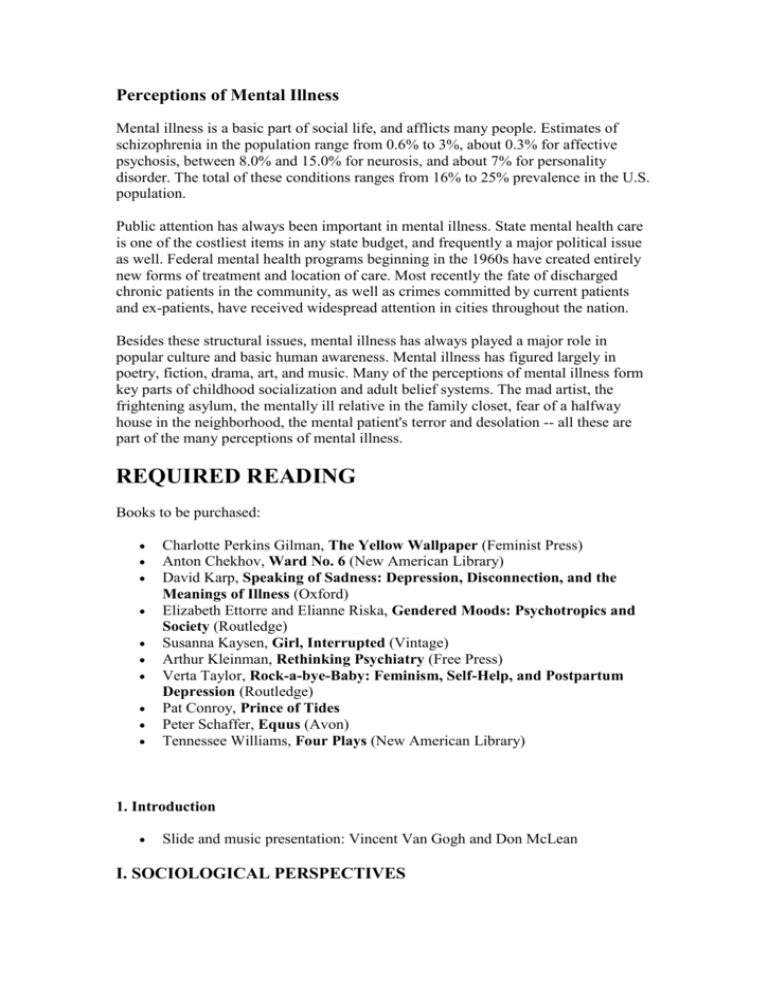
Perceptions of Mental Illness Mental illness is a basic part of social life, and afflicts many people. Estimates of schizophrenia in the population range from 0.6% to 3%, about 0.3% for affective psychosis, between 8.0% and 15.0% for neurosis, and about 7% for personality disorder. The total of these conditions ranges from 16% to 25% prevalence in the U.S. population. Public attention has always been important in mental illness. State mental health care is one of the costliest items in any state budget, and frequently a major political issue as well. Federal mental health programs beginning in the 1960s have created entirely new forms of treatment and location of care. Most recently the fate of discharged chronic patients in the community, as well as crimes committed by current patients and ex-patients, have received widespread attention in cities throughout the nation. Besides these structural issues, mental illness has always played a major role in popular culture and basic human awareness. Mental illness has figured largely in poetry, fiction, drama, art, and music. Many of the perceptions of mental illness form key parts of childhood socialization and adult belief systems. The mad artist, the frightening asylum, the mentally ill relative in the family closet, fear of a halfway house in the neighborhood, the mental patient's terror and desolation -- all these are part of the many perceptions of mental illness. REQUIRED READING Books to be purchased: Charlotte Perkins Gilman, The Yellow Wallpaper (Feminist Press) Anton Chekhov, Ward No. 6 (New American Library) David Karp, Speaking of Sadness: Depression, Disconnection, and the Meanings of Illness (Oxford) Elizabeth Ettorre and Elianne Riska, Gendered Moods: Psychotropics and Society (Routledge) Susanna Kaysen, Girl, Interrupted (Vintage) Arthur Kleinman, Rethinking Psychiatry (Free Press) Verta Taylor, Rock-a-bye-Baby: Feminism, Self-Help, and Postpartum Depression (Routledge) Pat Conroy, Prince of Tides Peter Schaffer, Equus (Avon) Tennessee Williams, Four Plays (New American Library) 1. Introduction Slide and music presentation: Vincent Van Gogh and Don McLean I. SOCIOLOGICAL PERSPECTIVES 2. The Experience of Madness Charlotte Perkins Gilman, The Yellow Wallpaper Sylvia Plath, "Johnny Panic and the Bible of Dreams"(R) Anonymous, "Labeling Someone Mentally Ill" (R) Recommended: Catherine Golden, ed., The Captive Imagination: A Casebook on "The Yellow Wallpaper" Rollo May, ed. Existence Susan Sheehan, Is There No Place on Earth for Me? Ken Kesey, One Flew Over the Cuckoo's Nest R.D. Laing, The Politics of Experience R.D. Laing, The Divided Self Barbara Gordon, I'm Dancing as Fast as I Can Susan Baur, The Dinosaur Man: Tales of Madness and Enchantment from the Back Ward 3. The Medical Model -- Critics and Defenders Thomas Scheff, "Labeling Theory" (R) Maurice Temerlin, "Suggestion Effects in Psychiatric Diagnoses" (R) David Rosenhan, "On Being Sane in Insane Places" (R) Walter R. Gove, "The Current Status of the Labeling Theory of Mental Illness (R) Bruce Link and Bruce Dohrenwend, "Epidemiology of Mental Disorders," from Sol Levine and Howard Freeman, ed., Handbook of Medical Sociology (R) Frigyes Karinthy, "Psychiatry" (R) Allan Wheelis, "The League of Death" (R) Film: "The Promise" Recommended: Thomas Scheff, Mental Illness and Social Process Thomas Szasz, The Myth of Mental Illness Alan Horwitz, The Social Control of Mental Illness Ronald Bayer, Homosexuality and American Psychiatry: The Politics of Diagnosis Peter Sedgwick, Psycho Politics: Laing, Foucault, Goffman, Szasz, and the Future of Mass Psychiatry 4. Stigma and Responsibility Susanna Kaysen, Girl, Interrupted -this week will include discussion of the film "The Promise" 5. Sex Roles and Social Construction Verta Taylor, Rock-a-bye-Baby: Feminism, Self-Help, and Postpartum Depression 6. The Personal Experience of Depression David Karp, Speaking of Sadness: Depression, Disconnection, and the Meanings of Illness (Oxford) Guest Speaker: David Karp (Professor of Sociology, Boston College) 7. Mental Health Institutions --History and Political-Economy Andrew T. Scull, "Madness and Segregative Control: The Rise of the Insane Asylum" (R) Gerald Grob, "Marxian Analysis and Mental Illness," Bulletin of the History of Psychiatry 1990 1:223-232 (R) David Rothman, "The Enduring Asylum" (R) Joseph P. Morrissey, Howard H. Goldman, and Lorraine V. Klerman, "Cycles of Institutional Reform" (R) Recommended: Joseph P. Morrissey, Howard H. Goldman and Lorraine V. Klerman, eds., The Enduring Asylum: Cycles of Institutional Reform at Worcester State Hospital. Andrew Scull, Decarceration: Community Treatment and the Deviant Paul Lerman, Deinstitutionalization and the Welfare State Robert Castel, Francoise Castel, and Anne Lovell, The Psychiatric Society Phil Brown, The Transfer of Care: Psychiatric Deinstitutionalization and its Aftermath 8. Social Structure of the Mental Hospital Edgar Allan Poe, "The System of Dr. Tarr and Professor Fether"(R) Anton Chekhov, Ward No. 6 Erving Goffman, Asylums (R) Judi Chamberlin, "Inside the Mental Patients' Association" (R) Raymond M. Weinstein, "The Mental Hospital from the Patients' Point of View," (R) Recommended: Robert Perrucci, Circle of Madness Morris Schwartz and Alfred Stanton, The Mental Hospital Anselm Straus et al., Psychiatric Ideologies and Institutions John K. Wing and George W. Brown, Institutionalism and Schizophrenia Film: "One Flew Over the Cuckoo's Nest" 9. Gender, Social Control, and Psychotropic Medication Elizabeth Ettorre and Elianne Riska, Gendered Moods: Psychotropics and Society 10. Mental Health Policy - Community Mental Health, Deinstitutionalization, and Beyond David Mechanic and David Rochefort, "Deinstitutionalization: An Appraisal of Reform," Annual Review of Sociology 1990 16:301-327 (R) Theodore Marmor and Karyn Gill, "The Political and Economic Context of Mental Health Care in the United States,"Journal of Health Policy, Politics, and Law 1989 14:459-475 (R) William Gronfein, "Psychotropic Drugs and the Origins of Deinstitutionalization" Social Problems 1985:437-54 (R) Phil Brown and Elizabeth Cooksey, "Mental Health Monopoly: Corporate Trends in Mental Health Services" Social Science & Medicine 1989, 28:11291138 (R) Leslie Scallet, "Paying for Public Mental Health Care." Health Affairs Spring 1990 117-124 (R) Carl A. Taube, Howard H. Goldman, and David Salkever, "Medicaid Coverage for Mental Illness: Balancing Access and Costs," Health Affairs 1990, Spring:5-18 (R) Robert Dorwart, "Managed Mental Health Care: Myths and Realities in the 1990s" Hospital and Community Psychiatry 1990 41:1087-1091(R) Recommended: David Rochefort, From Poorhouses to Homelessness: Policy Analysis and Mental Health Care 11. The Clinical Setting: Diagnosis and Interaction Arthur Kleinman, Rethinking Psychiatry Elizabeth Cooksey and Phil Brown, "Spinning on its Axes: DSM and the Social Construction of Psychiatric Diagnoses" International Journal of Health Services (in press) (R) Recommended: Stuart Kirk and Herb Kutchins, The Selling of DSM Stuart Kirk and Herb Kutchins, Making Us Crazy: DSM -- The Psychiatric Bible and the Creation of Mental Disorders Paula Caplan, They Say You're Crazy II. MENTAL ILLNESS IN THE ARTS 12. Madness and Creativity Kay Jamison, Touched with Fire: Manic-Depressive Illness and the Artistic Temperament - Introduction, Ch. 1-3 (pp. 3-90) (R) Recommended: George Becker The Mad Genius Controversy Barry Panter et al., Creativity and Madness Frank Barron, Creativity and Psychological Health Edrita Fried, Artistic Productivity and Mental Health D. Jablow Hershman and Julian Lieb, The Key to Genius Philip Sandblom, Creativity and Disease: How Illness Affects Literature, Art, and Music Jane Piirto, Understanding Those Who Create Arnold Ludwig, The Price of Greatness Albert Rothenberg, Creativity and Madness Mark Freeman, Finding the Muse: A Sociopsychological Inquiry into the Conditions of Artistic Creativity Vera Zolberg, Constructing a Sociology of the Arts 13. Madness in Art - Van Gogh Meyer Schapiro, "Van Gogh's `Crows Over a Wheatfield'" (R) Ellen Winner, Invented Worlds - excerpts (R) Recommended: J. Hulsker, Vincent and Theo Van Gogh: A Dual Biography Ralph Pickford, Studies in Psychiatric Art Marie Naevestad, The Colors of Rage and Love Ernest Kris, Psychoanalytic Explorations in Art 14. Madness in Art: Portrayals of Madness by Established Artists John McGregor, The Discovery of the Art of the Insane Intro, Ch. 1-5 (R) Slide presentations: Portrayals of madness by established artists 15. The Art of Mental Patients John McGregor, The Discovery of the Art of the Insane Ch. 6-8 (R) Slide presentation: the art of mental patients film: "Prince of Tides" F Apr. 17 Section Discussion ** Paper #3 Due - "Artistic Perspectives on Mental Illness" 16. Madness in Fiction - Madness in its Social Context Pat Conroy, The Prince of Tides Recommended: Lillian Feder, Madness in Literature Leslie Rabkin, Psychopathology & Literature John Vernon, The Garden and the Map: Schizophrenia in 20th Century Literature and Culture Anne Stevenson, Bitter Fame: A Life of Sylvia Plath Jesse Geller and Paul Spector, Psychotherapy: Portraits in Literature Marge Piercy, Woman on the Edge of Time Charlotte Bronte, Jane Eyre Jean Rhys, The Wide Sargasso Sea Alan Roland, ed., Psychoanalysis, Creativity and Literature: A FrenchAmerican Inquiry Shoshana Feldman, Writing and Madness: Literature/Philosophy/Psychoanalysis Edward Dudley and Maximillian Novak, eds., The Wild Man Within: An Image in Western Thought from the Renaissance to Romanticism Ainsworth O'Brien-Moore, Madness in Ancient Literature Hendrick Ruitenbeek, Psychoanalysis and Literature Sandra Gilbert and Susan Gubar, The Madwoman in the Attic: The Woman Writer & The Nineteenth Century Imagination Max Byrd, Visits to Bedlam: Madness and Literature in the 18th Century Michael DePorte, Nightmares and Hobbyhorses: Swift, Sterne and Augustan Ideas of Madness Penelope Doob, Nebuchadnezzar's Children: Conventions of Madness in Middle English Literature Marianne Yalom, Maternity, Mortality, and the Literature of Madness 17. Madness in Drama Tennessee Williams, Suddenly Last Summer Peter Schaffer, Equus Recommended: William Shakespeare, King Lear Luigi Pirandello, Henry IV William Inge, Splendor in the Grass Henry Somerville, Madness in Shakespearean Tragedy Robert Reid, Bedlam on the Jacobean Stage
